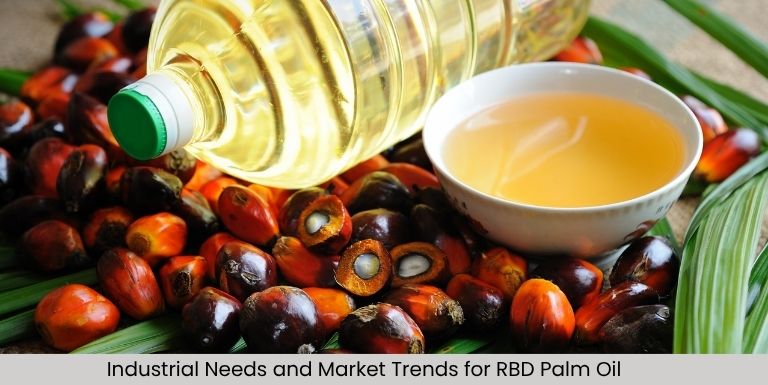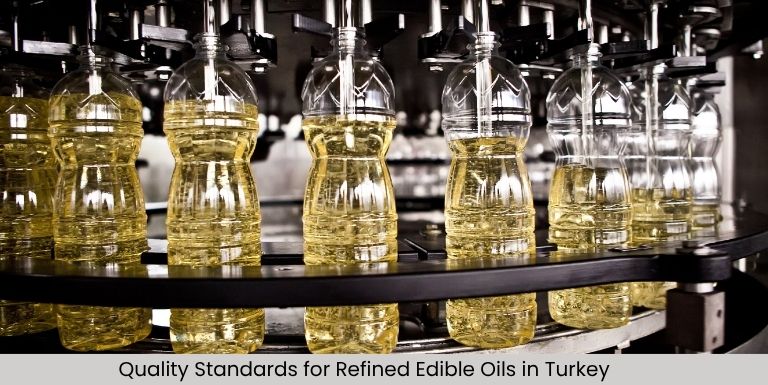Objective of the Article
The objective of this article is to analyze how Turkey’s dynamic food processing sector is driving the rising demand for RBD Palm Olein, RBD Coconut Oil, Vegetable Shortening, and Ghee. It aims to provide exporters, importers, and food manufacturers with practical insights into product specifications, applications, regulatory requirements, and trade opportunities. The content is structured for professionals in the edible oil, bakery, confectionery, and food service industries seeking to understand market trends and sourcing strategies in Turkey.

Introduction
Turkey’s food processing industry continues to expand, fueled by a growing population, rising disposable incomes, and increasing consumption of processed and convenience foods. From bakery and confectionery to snacks, frozen meals, and the HORECA segment, the need for reliable and cost-effective fats and oils has never been greater.
In this evolving market, RBD Palm Olein, RBD Coconut Oil, Vegetable Shortening, and Ghee have become essential ingredients for manufacturers looking to enhance texture, flavor, and stability while keeping production costs competitive. These fats offer versatility across a broad range of applications—from industrial frying and baking to ready-to-eat meals—making them indispensable in Turkey’s food ecosystem.
Turkey’s Expanding Food Processing Industry
Turkey has become one of the region’s leading food processing hubs, serving both domestic consumers and export markets across Europe, the Middle East, and Africa. The bakery, confectionery, snack, and dairy sectors have witnessed substantial investment in automation and capacity expansion.
Industrial bakeries in cities like Istanbul, Konya, and Izmir are scaling up production, demanding large volumes of refined fats that ensure consistency, flavor retention, and extended shelf life. The rapid rise in convenience foods and quick-service restaurants also contributes to the increasing demand for stable frying oils such as RBD Palm Olein and RBD Coconut Oil.

Major Demand Drivers
Industrial Modernization
Advanced production lines require fats that deliver predictable performance at varying temperatures. Both RBD Palm Olein and Vegetable Shortening meet these needs, offering longer frying cycles and uniform results.
Cost Optimization
Producers aim to balance performance with cost. RBD Palm Olein provides high oxidative stability and longer use cycles, reducing oil consumption and production losses.
HORECA Growth
Turkey’s hospitality and catering industry continues to expand with tourism. Hotels, restaurants, and caterers increasingly prefer refined oils like RBD Palm Olein and Ghee that offer aroma, frying stability, and value.
Consumer Taste Consistency
Turkish consumers associate texture and flavor consistency with product quality. Manufacturers rely on Vegetable Shortening and Ghee to achieve the desired sensory profile in pastries, sweets, and traditional dishes.
Product-Wise Market Overview of Vegetable Oils & Fats
RBD Palm Olein
A refined, bleached, and deodorized derivative of palm oil, RBD Palm Olein is prized for its versatility in frying and cooking. It offers a high smoke point, minimal foaming, and excellent heat resistance—qualities that make it indispensable in the snack, bakery, and ready-meal industries.
RBD Coconut Oil
Known for its lauric content and clean, light aroma, RBD Coconut Oil is a favorite in confectionery and dessert manufacturing. Its sharp melting point ensures quick flavor release and a smooth mouthfeel in chocolates, spreads, and creams.
Vegetable Shortening
This semi-solid blend provides structure, plasticity, and aeration in baked goods. It ensures flakiness in pastries, volume in cakes, and tenderness in cookies. Its non-hydrogenated, low trans-fat formulation aligns with Turkish health regulations.
Ghee
A traditional fat with a rich buttery aroma, Ghee is increasingly used in gourmet, ethnic, and dessert preparations. It delivers a unique flavor and maintains stability under high-heat cooking, making it popular in both industrial kitchens and foodservice applications.
Applications in Turkey’s Food Sectors
Bakery and Confectionery
RBD Palm Olein and Vegetable Shortening enhance the softness and texture of baked goods. RBD Coconut Oil adds gloss and crispness to chocolate coatings and icings, while Ghee provides a natural buttery flavor to premium sweets.
Snack Foods and Frying
For potato chips, extruded snacks, and ready-to-fry items, RBD Palm Olein is preferred for its extended frying life and low oil absorption. It maintains product crispness and color even after repeated use.
HORECA and Catering
Hotels, caterers, and quick-service restaurants rely on RBD Palm Olein and Ghee for consistent frying results and authentic flavor. Bulk packaging in 15 kg tins or flexitanks offers efficiency for high-volume kitchens.
Ready-to-Eat Meals and Frozen Foods
RBD Coconut Oil and Ghee enhance aroma and taste in ready meals, sauces, and desserts. They also prevent fat bloom in frozen confectionery and maintain desired texture after reheating.
Technical Specifications and Quality Standards
Refined edible oils and fats must meet strict quality benchmarks to ensure stability during processing and storage.
Key quality parameters include:
- Free Fatty Acid (FFA): ≤ 0.1 % for refined grades
- Peroxide Value (PV): ≤ 1.0 meq/kg to maintain freshness
- Moisture and Impurities: ≤ 0.1 %
- Color (Lovibond 5¼”): ≤ 3.0 Y / 0.3 R
- Cloud Point: ≤ 10 °C for RBD Palm Olein to ensure flow in cooler climates
Proper packaging—drums, tins, or flexitanks with nitrogen flushing—preserves product quality during shipping and warehousing in Turkey’s varied climate zones.

Regulatory and Compliance Framework
Turkey’s Food Codex Regulation defines strict norms for edible fats and oils.
- Trans-Fat Limit: Not more than 2 % of total fat content.
- Labeling Requirements: Product name, country of origin, ingredient list, and “non-hydrogenated” statement must appear in Turkish.
- Halal Certification: Mandatory for animal-based fats such as Ghee.
- Import Classification (HS Codes):
- RBD Palm Olein – 1511.90
- RBD Coconut Oil – 1513.19
- Vegetable Shortening – 1517.90
- Ghee – 0405.90
Importers must submit certificates of analysis, health and phytosanitary documents, and conformity declarations before customs clearance.
Trade and Supply Chain Overview
Global Sourcing Channels
Turkey imports RBD Palm Olein from Malaysia and Indonesia, RBD Coconut Oil from the Philippines and India, and Vegetable Ghee and Vegetable Shortening from India and the UAE. These regions provide reliable refining capacity and competitive freight routes via the Mediterranean.
Seasonal Demand Patterns
Peak demand occurs during Ramadan, Eid, and major national holidays when bakery and confectionery output rises sharply. The summer tourism season also increases HORECA consumption.
Price and Logistics Considerations
Landed prices depend on global CPO and CNO benchmarks, freight rates, and Turkish Lira exchange fluctuations. Efficient supply chains with warehousing near Mersin or Izmir ports help importers maintain consistent supply and control costs.
Packaging Formats
- Industrial: 190 kg drums, 1 MT IBCs, 20 MT flexitanks
- Foodservice: 15 kg tins, 20 L jerry cans
- Retail: 1–5 L PET bottles and pouches

Buyer Segments and Purchase Behavior
Industrial Manufacturers
Large biscuit, wafer, and bakery producers prioritize consistent product quality and technical support. They often negotiate long-term contracts with trusted suppliers.
Distributors and Private-Label Brands
These buyers import bulk quantities for repacking under their own brands. They value flexible packaging options and attractive labeling for retail markets.
HORECA Operators
Hotels, restaurants, and caterers prefer fats that combine high heat stability with cost efficiency. RBD Palm Olein and Ghee are staple ingredients in this segment.
Key Purchasing Criteria
- Reliable delivery schedules
- Technical consistency
- Competitive pricing
- After-sales service and formulation guidance
Opportunities for Exporters and Traders
Rising Import Dependency
Turkey relies on imports for most tropical oils and refined fats. Exporters offering ready-to-use refined products with high stability and long shelf life can capitalize on this gap.
Private-Label Supply
Turkish distributors frequently request customized packaging and branding. Exporters who provide private-label manufacturing and flexible container sizes can strengthen partnerships.
Application-Specific Formulations
Demand is increasing for shortening blends with defined melting ranges and plasticity to suit local climatic conditions. Exporters that offer tailored technical solutions enjoy a competitive edge.
Freight and Distribution Efficiency
Proximity to major ports, optimized shipping schedules, and regional warehouses improve responsiveness and reduce landed costs—an important factor for maintaining market share.
Market Outlook
Turkey’s edible fat and oil consumption is expected to rise steadily as food manufacturing expands and export demand from neighboring regions grows. The trend toward industrial automation, modern packaging, and ready-to-eat meals will further boost the use of refined fats.
Manufacturers are also exploring product innovation—like flavor-enhanced ghee or heat-stable shortening—to match specific applications. Exporters that can combine consistent quality with competitive pricing and technical collaboration will continue to benefit from Turkey’s growing appetite for RBD Palm Olein, RBD Coconut Oil, Vegetable Shortening, and Ghee.
Frequently Asked Questions
Why is RBD Palm Olein preferred in Turkey’s food industry?
Its high oxidative stability and cost efficiency make it ideal for industrial frying and large-scale food preparation.
How is RBD Coconut Oil used in Turkish food manufacturing?
It adds a clean flavor and smooth texture in confectionery, desserts, and non-dairy creams.
What are the labeling rules for edible oils in Turkey?
All product details must be in Turkish, including country of origin, ingredients, and a “non-hydrogenated” declaration.
Which fat performs best in repeated frying?
RBD Palm Olein retains clarity, reduces foaming, and prolongs fryer life, ensuring better yield.
What is the shelf life of Vegetable Shortening?
Around 12 months when stored below 30 °C and away from moisture and direct sunlight.
Is Halal certification mandatory for Ghee imports?
Yes. All animal-derived fats require Halal compliance to be accepted by Turkish authorities.
What packaging options are used by industrial buyers?
Bulk packaging includes 190 kg drums and 20 MT flexitanks for large manufacturers.
What quality parameters are crucial for refined fats?
Low FFA (≤ 0.1 %), low PV (≤ 1 meq/kg), minimal impurities, and neutral odor are essential.
How can exporters build a presence in Turkey?
Collaborating with local distributors, offering flexible shipping options, and maintaining consistent supply are key success factors.
Conclusion
Turkey’s fast-growing food processing sector presents lucrative opportunities for suppliers of RBD Palm Olein, RBD Coconut Oil, Vegetable Shortening, and Ghee. These products fulfill essential roles in frying, baking, confectionery, and foodservice operations, ensuring consistency, texture, and flavor in a competitive market.
With demand accelerating across industrial and retail segments, suppliers who offer reliable logistics, tailored formulations, and technical expertise will continue to thrive in Turkey’s evolving edible fats landscape.
Author Bio

Sales Manager
Muhammad Usman, Sales Manager at Usha Edible Oil, combines years of industry experience with a strong focus on customer relationships. His expertise ensures that Usha Edible Oil delivers high-quality products, including RBD Palm Oil (CP6, CP8 and CP10), RBD Coconut Oil, Specialty Fats, Vegetable Shortening, Vegetable Ghee, and Margarine, to meet the diverse needs of global markets.
With a commitment to excellence, Muhammad continues to lead Usha Edible Oil in providing innovative and reliable vegetable oils and fats, solidifying its position as a trusted supplier in the food industry.
